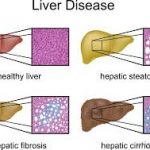Liver Disease Cirrhosis
Cirrhosis survival rates dropped markedly among hospitalized vs. ambulatory patients
Cirrhosis survival rates dropped markedly among hospitalized vs. ambulatory patients Ratib S. Hepatology. 2014;60:282-289. NOTE: This is hardly surprising. Once someone is admitted to hospital their diet consists of hospital food. Patients with cirrhosis are most often malnourished and putting them on a hospital diet is like a kiss of death. When are people going…
Read MoreH. Ascites, Weight, Protein and Hernias
H. Ascites, Weight, Protein and Hernias By around March my weight was becoming seriously alarming. I was losing about 5lbs of body mass per month and nothing I could do seemed to make any difference. I weighed myself multiple times per day hoping to see an improvement or at least a stabilization, but none was…
Read MoreLiver Care After Successful Hepatitis C Treatment
Liver Care After Successful Hepatitis C Treatment March 19, 2014 Being cured of Hepatitis C is an exciting and more frequent occurrence thanks to improvements in antiviral therapy; however, caring for your liver afterwards is important for the liver’s longevity. By Nicole Cutler L.Ac. One of your most precious internal organs, the liver takes a…
Read MoreSofosbuvir taken before or after liver transplant reduces hepatitis C recurrence
Sofosbuvir taken before or after liver transplant reduces hepatitis C recurrence Liz Highleyman An interferon-free combination of sofosbuvir plus ribavirin administered before liver transplantation prevented hepatitis C recurrence in nearly two-thirds of patients, while the same regimen led to early viral clearance in three-quarters of those treated after transplantation, according to studies presented this week…
Read MoreAntiviral therapy may halve risk of liver cancer after chronic hepatitis C infection
Antiviral therapy may halve risk of liver cancer Treating chronic hepatitis C infection with antiviral drugs could halve the risk of developing the most common form of liver cancer, in some cases, indicates an analysis of the published research in one of the new BMJ Open Editions.* Hepatocellular carcinoma is the most common form of…
Read MoreTreating Liver Disease
Treating Liver Disease I had to post this. If you read it carefully, this article confirms what I have been saying about TREATING cirrhosis through dietary means rather than being hung out to die. Craig Treating Liver Disease The predisposing cause should be identified and eliminated. Identify and remove any drug or toxin which may…
Read MoreThe Stages of Cirrhosis
The Stages of Cirrhosis There are four stages of chronic liver disease. 1. The commonest and mildest form of liver damage is a ‘fatty’ liver. This can be identified by blood tests, and is reversible with abstinence from alcohol. 2. The next step cannot be identified by blood tests, but a liver biopsy will show…
Read MoreLiver Disease FAQ
Liver Disease FAQ Q How does liver disease affect nutrition? A Many chronic liver diseases are associated with malnutrition. The most common is cirrhosis, which is the scarring of the liver. Cirrhosis can occur by repeated injury to liver cells, which can be caused by excessive alcohol intake, chronic viral hepatitis, exposure to certain drugs…
Read MoreLiver Cirrhosis
Liver Cirrhosis Cirrhosis is defined as the histological development of regenerative nodules surrounded by fibrous bands in response to chronic liver injury, that leads to portal hypertension and end stage liver disease. Recent advances in the understanding of the natural history and pathophysiology of cirrhosis, and in treatment of its complications, resulting in improved management,…
Read MoreFibrosis Progression to Cirrhosis
Fibrosis and Cirrhosis Cirrhosis is a late stage of hepatic fibrosis that has resulted in widespread distortion of normal hepatic architecture. Cirrhosis is characterized by regenerative nodules surrounded by dense fibrotic tissue. Symptoms may not develop for years and are often nonspecific (eg, anorexia, fatigue, weight loss). Late manifestations include portal hypertension, ascites, and, when…
Read More








